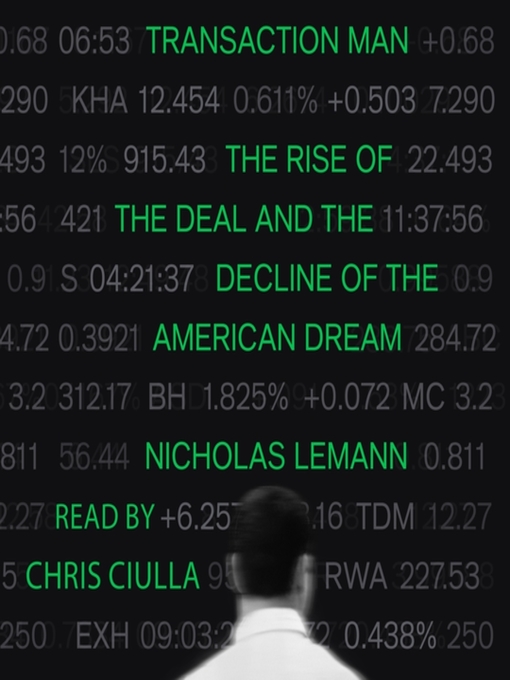This program includes a prologue and epilogue read by the author.
Over the last generation, the United States has undergone seismic changes. Stable institutions have given way to frictionless transactions, which are celebrated no matter what collateral damage they generate. The concentration of great wealth has coincided with the fraying of social ties and the rise of inequality. How did all this come about?
In Transaction Man, Nicholas Lemann explains the United States'—and the world's—great transformation by examining three remarkable individuals who epitomized and helped create their eras. Adolf Berle, Franklin Delano Roosevelt's chief theorist of the economy, imagined a society dominated by large corporations, which a newly powerful federal government had forced to become benign and stable institutions, contributing to the public good by offering stable employment and generous pensions. By the 1970s, the corporations' large stockholders grew restive under this regime, and their chief theoretician, Harvard Business School's Michael Jensen, insisted that firms should maximize shareholder value, whatever the consequences. Today, Silicon Valley titans such as the LinkedIn cofounder and venture capitalist Reid Hoffman hope "networks" can reknit our social fabric.
Lemann interweaves these fresh and vivid profiles with a history of the Morgan Stanley investment bank from the 1930s through the financial crisis of 2008, while also tracking the rise and fall of a working-class Chicago neighborhood and the family-run car dealerships at its heart. Incisive and sweeping, Transaction Man is the definitive account of the reengineering of America—with enormous consequences for all of us.
Transaction Man
The Rise of the Deal and the Decline of the American Dream
-
Creators
-
Publisher
-
Release date
September 10, 2019 -
Formats
-
OverDrive Listen audiobook
- ISBN: 9781250245656
- File size: 343100 KB
- Duration: 11:54:47
-
-
Languages
- English
-
Reviews
-
Publisher's Weekly
Starred review from July 29, 2019
New Yorker staff writer Lemann (The Promised Land) describes the evolution of American corporate culture in this excellent and unusually framed economic history. Lemann describes how the American worker once dedicated his or her life to a single company, receiving generous benefits, career-long job security, and a pension, whereas the transaction man labors at the mercy of corporate shareholders who may sell, break up, or merge a company to maximize share price. Lemann attributes this change to the work of economists Milton Friedman, who believed the sole function of corporations was to maximize profits for shareholders, and Michael Jensen, who justified rapacious junk bond trading, hostile takeovers, and debt-leveraged buyouts. Lemann also depicts this transformation of the American economy at the micro level through its effect on one neighborhood, Chicago Lawn, which saw the disastrous dissolution of its auto dealerships after General Motors’ bankruptcy. He thoughtfully links income inequality to the transactional theories of the corporation and looks ahead to a possible future model for “pluralism,” wherein political and economic power is diffuse and distributed, rather than held in “institutions, transactions, or networks.” This concise and cogent history of the theories that have transformed the American economy makes a potentially dry subject fascinating.
-
Loading
Why is availability limited?
×Availability can change throughout the month based on the library's budget. You can still place a hold on the title, and your hold will be automatically filled as soon as the title is available again.
The Kindle Book format for this title is not supported on:
×Read-along ebook
×The OverDrive Read format of this ebook has professional narration that plays while you read in your browser. Learn more here.

